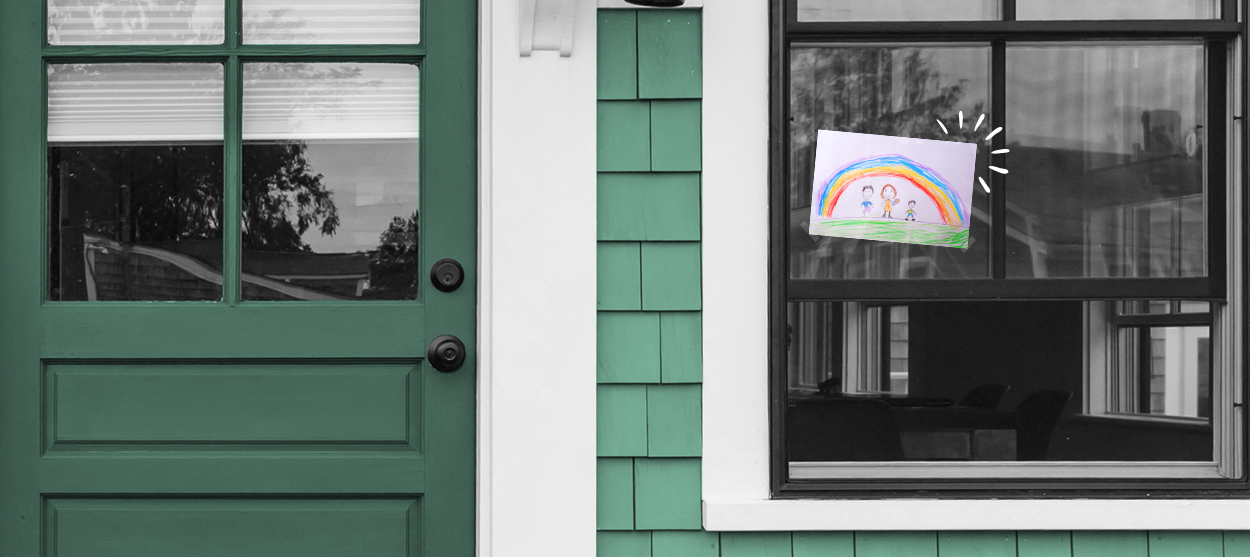How parents can use coronavirus to teach kids about compassion
When the world feels dark, teach kids to make it lighter


A free daily email with the biggest news stories of the day – and the best features from TheWeek.com
You are now subscribed
Your newsletter sign-up was successful
The global coronavirus pandemic has forced millions of families to cancel plans, stay home from work and school, and self-quarantine together. This can be frustrating and boring for lots of us, and especially for children. But it presents a good opportunity to teach kids about social responsibility, and how their own seemingly small acts of sacrifice and kindness — from washing hands and staying home, to volunteering for those in need — can improve the lives of many, many others.
"This is perhaps the greatest opportunity in decades to teach children about life's delicate balance between looking out for ourselves and doing what we want, and looking out for others and doing what is best for the country," says Mike Erwin, the co-founder and chairman of The Positivity Project, which partners with educators to help them empower young people through positive relationships.
You can't teach social responsibility unless your kids understand what, exactly, it is. Keep the explanation simple: Social responsibility is the idea that our actions affect others, and we should aim to have a positive impact on other people and on society as a whole. Put it in the context of the COVID-19 pandemic by explaining why hoarding supplies or over-buying at this time is not the right thing to do. "Show them videos and talk about the millions of doctors, nurses, pharmacists, grocery store owners, and other critical workers who are working long hours to keep the country going, share the stories of people who are showing kindness in their community by shopping for the elderly, donating blood, volunteering in food banks, etc.," Erwin says.
The Week
Escape your echo chamber. Get the facts behind the news, plus analysis from multiple perspectives.

Sign up for The Week's Free Newsletters
From our morning news briefing to a weekly Good News Newsletter, get the best of The Week delivered directly to your inbox.
From our morning news briefing to a weekly Good News Newsletter, get the best of The Week delivered directly to your inbox.
But talking about what others are doing only goes so far, he adds. "To teach the concept well, it has to go from concept to action." So what are some ways kids can safely practice being socially responsible right now, when they're basically confined to their homes and their contact with other people is so restricted?
You can start the next time you go out for a walk (observing social distancing guidelines, of course), Erwin says. Smile and exchange a few words with anyone you pass. You might not be able to shake their hand or give them a hug, but that doesn't mean you have to avoid eye contact.
Another powerful way to show kindness during the COVID-19 era is to reach out to anyone in the high-risk group — people age 65 or older and people of any age who have serious underlying medical conditions, such as chronic lung disease or moderate to severe asthma, per the CDC. "Ask if you can do their grocery shopping for them, or run any essential errands that will allow them to stay inside their home," Erwin says.
Yesterday, my kids and I drew rainbows and taped them to the road-facing windows of our house — part of an initiative shared on a local Facebook page set up to share resources, support, and tips during our nationwide lockdown. It turns out that it's not just a local thing — kids all over the world are doing it, too. "You can create a neighborhood treasure hunt in your windows," says Justine Bruyère, a lecturer on the reading education program in the department of teaching and learning at Vanderbilt University's Peabody College. "Setting a theme can help: alphabet day, farm animals day, colors day, and so on. Create a master 'treasure hunt' style list of the images on the street, then take your kids for a walk and look for all the items on the list."
A free daily email with the biggest news stories of the day – and the best features from TheWeek.com
This one checks more than one box. Brightly-colored images in windows put smiles on the faces of passersby, and crafting is also a good way to keep kids busy and creative during long stretches of time at home.
Marcy Singer-Gabella, a professor in the department of teaching and learning at Vanderbilt University's Peabody College, suggests following your kid's lead when it comes to taking actions that can have a positive effect on the world. "'Children can — and usually do — come up with great ideas all on their own," she says. "So be careful not to direct their thinking too much."
If you need some inspiration, think about writing to your neighbors using sidewalk chalk, sharing poetry readings online with friends and family, donating surplus non-perishables to a local food pantry, and checking in with grandparents and other vulnerable people on a daily basis. Social media-savvy kids may want to create an online campaign to share important information and resources with their community. Whether the goal is to break through social isolation or ensure people have all the food and essential supplies they need, these acts can illustrate to kids the value of social responsibility — not just in the next few weeks and months, but for the rest of their lives.
"Modeling is so important, as is making visceral to kids what it feels like to give as well as receive kindness," Singer-Gabella says. On that note, Bruyère suggests writing a "gratitude list" with your kids and displaying it in your home. This might include gratitude for doctors and nurses, food, people who keep you informed, and a neighborhood of people who care. By reminding your children of all the ways in which others are showing respect and love for them, they see the importance in paying it forward.
It's difficult to keep kids away from social media at the best of times, and with so much focus on the new coronavirus, there's the risk of overexposure to negative stories. "Every day, scan the news for the people who are going good," Bruyère says. From the grocery store owners in Scotland who are giving away free "COVID-19 kits" to the over-65s, to the artists putting on impromptu free concerts via social media, take the time to talk about these positive stories with your kids.
"By sharing the good we are seeing in the world, we give children the language of hope and possibility in a time that is filled with worry," Bruyère says.
Want more essential commentary and analysis like this delivered straight to your inbox? Sign up for The Week's "Today's best articles" newsletter here.
Claire Gillespie is a freelance writer with bylines on Health, SELF, Refinery29, Glamour, The Washington Post, and many more. She likes to write about parenting, health, and culture. She lives in Scotland with her husband and six kids, where she uses every (rare) spare moment to work on her novel.
-
 Crisis in Cuba: a ‘golden opportunity’ for Washington?
Crisis in Cuba: a ‘golden opportunity’ for Washington?Talking Point The Trump administration is applying the pressure, and with Latin America swinging to the right, Havana is becoming more ‘politically isolated’
-
 5 thoroughly redacted cartoons about Pam Bondi protecting predators
5 thoroughly redacted cartoons about Pam Bondi protecting predatorsCartoons Artists take on the real victim, types of protection, and more
-
 Palestine Action and the trouble with defining terrorism
Palestine Action and the trouble with defining terrorismIn the Spotlight The issues with proscribing the group ‘became apparent as soon as the police began putting it into practice’
